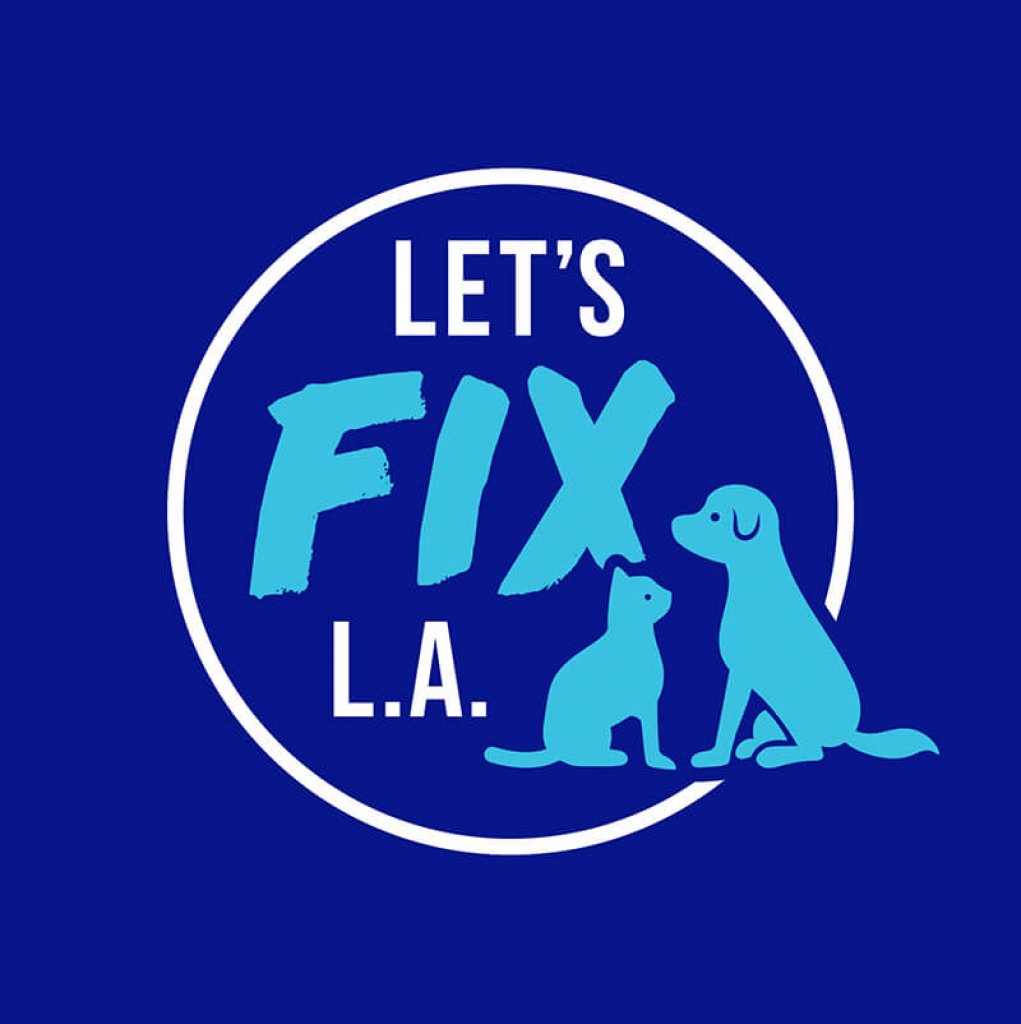
Welcome to Let’s Fix L.A., PETA’s program to help you have your dogs, cats, and rabbits spayed or neutered in Los Angeles. We have all the resources and information that you need to get started!
Every year, tens of thousands of animals end up in shelters across Los Angeles. While many are reunited with their loving human families or are adopted into new homes, thousands of others must be euthanized—often because there are too many animals and not enough good homes for them all. Spaying or neutering is the only way to “fix” this crisis. Help us spread the word—and let’s fix L.A. together!
Spaying and Neutering Saves Lives—and Money
Sterilization is among the safest and most routine surgeries that veterinarians perform. Having your animals spayed or neutered is beneficial to their health and your wallet—and it helps end the homeless-animal crisis. Plus, it’s the law.
Cats and dogs who are sterilized are less prone to developing mammary or prostate cancer and have no risk of suffering from uterine or testicular cancer. They’re also less likely to contract deadly, contagious diseases, such as feline immunodeficiency virus (feline AIDS).
“Fixed” animals are better citizens, too. Spaying or neutering animals helps curb potentially dangerous behavior, including roaming in search of mates, fighting, territorial marking, spraying, “humping,” and aggression. Dogs who have been neutered are three times less likely to bite.
Spaying and Neutering Cats in Los Angeles
Whether they’re socialized or feral, all cats are domesticated and depend on humans for food, shelter, veterinary care, and protection.
Los Angeles’ spay/neuter law means that fewer cats will be born only to end up struggling to survive on the urban jungle’s mean streets. Speeding cars, cruel humans, attacks by predators, scarce food and water, poisons, contagious diseases, and untreated injuries are just a few of the deadly dangers cats face—and often die from—when they’re abandoned to live outdoors. When left on their own, their lives are harsh and short—a constant struggle to survive, followed by an early and often painful death. The life expectancy of cats who live outdoors is just one to five years, compared with 12 to 20 years for cats who live indoors.
Groups and individuals who sterilize cats and then put them back on the streets prevent them from breeding but sentence them to terrible hardship, suffering, and a terrifying death. Cats who are allowed to roam outdoors take a massive toll on vulnerable wildlife species who are already struggling to survive habitat loss and other challenges. One study estimates that free-roaming cats kill up to 14.7 billion birds and mammals every year in the U.S. Cats rank second for bird mortality behind only natural causes.
Instead of forcing cats to once again live outdoors, we can work to end feline homelessness at its root by ensuring that all of them are spayed or neutered and kept indoors.
Spaying and Neutering Dogs in Los Angeles
Stray dogs are as much a fixture in Los Angeles as palm trees and celebrity sightings, but the city’s spay/neuter law is helping to change that situation. Many homeless dogs are unneutered males who have slipped out of homes or yards in search of a mate, and they’re often hit by cars or injured in fights with other dogs.
If you see a stray dog, always stop and help—you may be that animal’s only chance of survival. It’s also vital to get strays off the streets before they can mate and create even more unwanted animals. Be sure not to let the animal out of your sight, and call Los Angeles Animal Services right away at 888-452-7381 to ask for help.
Carry an emergency kit containing a towel, a slip leash, water, a bowl, smelly treats, and a pop-top can of wet food (to entice skittish animals to come to you). Stray dogs are usually frightened, so speak in a soft voice and avoid chasing them or making sudden movements.
Once the animal is secured, check for injuries and identification tags. The dog may have a microchip from which their guardian’s information can be retrieved, so ask your local veterinarian’s office to do a scan if there are no tags. If they have tags or a microchip, call the number that’s listed on it and arrange a reunion. Encourage the dog’s guardians to have the animal spayed or neutered if they haven’t already done so, and direct them here for more information. If the dog has no tags or appears to be injured, abused, or neglected, rush them to the nearest shelter. Remember: If you don’t stop to help, who will?
Spaying and Neutering Rabbits in Los Angeles
Rabbits are the third most frequently abandoned animals, but—just as with dogs and cats—they should be spayed or neutered to help bring down the number of homeless animals flooding into shelters.
Rabbits are social creatures with gentle natures and individual personalities, and they need just as much attention as a dog or cat would. Although most rabbits don’t like to be held or cuddled, they love to exercise and play. They can become withdrawn and depressed if they’re not provided with plenty of love and companionship.
Rabbits are also complex animals. They’re often purchased on a whim, especially in the spring, and potential caretakers rarely understand their specific needs. Once the novelty has worn off, many rabbits are neglected, relegated to outdoor cages, left at shelters, or simply turned loose outside—where they have little chance of surviving. In addition to often living up to 10 years, rabbits require specific foods, stimulating environments, and care from veterinarians who have specialized knowledge of their species. If, after careful consideration, you decide to welcome a rabbit companion into your home, remember to adopt—not shop! Visit your local open-admission animal shelter or rabbit rescue group and save a life.
Spay/Neuter Help
Need a low-cost spay/neuter option for your dog, cat, or rabbit? Fill out an online application to get a free or discounted spay/neuter voucher!
Los Angeles Residents
Get up to three sterilization vouchers per species from Los Angeles Animal Services. Veterinarians across Los Angeles participate in the discount spay/neuter program.
Los Angeles County Residents
Get up to three spay/neuter vouchers from Los Angeles County Animal Control and Care. Veterinarians across Los Angeles County participate in the discount spay/neuter program.
In addition to the city voucher program, low-cost and free surgeries are available at many mobile clinics in Los Angeles and Los Angeles County. Check out these clinics’ spay/neuter calendars and book an appointment today!
Frequently Asked Questions
The City of Los Angeles Municipal Code is one of the most progressive in the country when it comes to protecting animals. It helps ensure that residents care responsibly for cats and dogs by having them sterilized, licensed, and vaccinated against rabies and by never chaining them for long periods.
We’ve summarized the code’s requirements below, so it’s easy to make sure you’re doing the right thing.
What Are the Spaying and Neutering Laws in Los Angeles?
In the city of Los Angeles, all cats and dogs over the age of 4 months must be spayed or neutered unless certain conditions are met or a breeding permit is purchased and renewed annually. Fines for noncompliance can reach $500 per animal, and repeated failure to comply by having the animal sterilized is a misdemeanor. Animals who are impounded will be sterilized and microchipped at their guardian’s expense.
Does My Animal Companion Need to Be Licensed?
All dogs over the age of 4 months must be licensed by law, and their guardians must have proof of their anti-rabies vaccination. Licenses must be renewed every one to three years, and spayed or neutered dogs qualify for a lower license fee. Puppy certificates are available for dogs under 4 months of age and must be replaced with a regular dog license within 45 days after the puppy reaches 4 months.
Licensing helps ensure that you’re quickly reunited with your animals if they become lost. Plus, a portion of the fee goes to the Animal Sterilization Fund, which provides funds to enable low-income residents to have their animals fixed. Apply for a dog license online—it’s easy!
Is Chaining or Tethering a Dog Outside Legal in Los Angeles?
It’s unlawful to chain a dog to any stationary object except in very specific circumstances and for a limited amount of time. If you see a dog chained or tethered outside, call Los Angeles Animal Services at 888-452-7381 to report it so the department can investigate and rescue the dog or inform their owner about proper care.
Keeping dogs outside deprives them of companionship, exercise, and mental stimulation. Many chained animals are terribly neglected, including being denied proper food, water, shelter, and veterinary care—not to mention exercise, love, companionship, and respect. Female chained dogs who aren’t spayed have no way to escape roaming males, so countless puppies have been born to mothers who are trapped at the end of a chain. Always take action if you see a chained dog. For that animal, your intervention could mean the difference between a lonely, miserable existence and a happy life in a loving home.
Where Can I Have My Dog Off-Leash in Los Angeles?
It’s illegal to have a dog off-leash on a public street, in a park, or in any other public area. Anytime dogs are off private property, they must be on a leash that doesn’t exceed 6 feet in length. L.A.’s leash law keeps your dog, other animals, and humans safe. Keeping dogs leashed while in public helps protect them from getting hit by cars, attacked by other dogs, and being stolen or harmed by humans. Leashes longer than 6 feet are dangerous to your dog, as they make it more difficult to reach the animal quickly. Want to help multiple animals at once? Why not purchase a leash and other canine accessories from the PETA Shop? All profits from merchandise sales go directly to supporting our vital work for animals, so you can help all animals while keeping your pup safe.
Is ‘No-Birth’ Different From ‘No-Kill’?
Yes! Every kind person wants to see a day when no healthy, behaviorally sound animals must be euthanized in shelters due to a lack of good homes. That’s one of the reasons why Los Angeles passed its spay/neuter law—to help stop the cause of cat and dog homelessness.
Becoming a “no-birth” community by ensuring that all cats and dogs are sterilized is the key to becoming a “no-kill” community. “No-birth” is humane, effective, and sustainable, unlike anti-euthanasia polices at taxpayer-funded shelters. When shelters declare themselves “no-kill” before the animal birth rate is controlled, they quickly fill up and start turning animals away—leaving them in the hands of people who can’t or won’t care for them—or on the streets, where they can suffer and face a painful death from starvation, traffic accidents, weather extremes, or another cruel fate.
Some “no-kill” facilities are in fact run by hoarders who warehouse animals in cages for years and deny them veterinary treatment, attention, adequate care, and the opportunity to exercise. That’s why it’s so important to take stray animals (or your own if you can no longer care for them) only to well-run open-admission shelters that never turn animals away or hoard them in cages. The solution to animal homelessness is ending the runaway birth rate. Together, we can lower the number of animal births by complying with Los Angeles’ spay/neuter law and taking advantage of the many resources that are available to help.
What Difference Does Spaying or Neutering One Animal Make?
A big one! Just one unsterilized female dog can have more than 100 puppies during her lifetime, and males can father thousands. In just 18 months, a female cat can give birth to 36 kittens, who can begin reproducing in just four months. Even if you manage to find loving, permanent homes for all the puppies or kittens your animal brings into the world, there will be that many fewer homes for animals in shelters who desperately need to be adopted. Unless you ensure that all the puppies and kittens you place are spayed or neutered before going to their new homes, they can go on to produce litter after litter of offspring themselves. Every single surgery spares a life.
What Should I Do if My Animal Is Missing?
Drop everything. Put up as many “missing” ads as you can, showing a clear photo of your animal, your contact information, and a mention of a reward. Post them on telephone poles, in veterinarians’ offices, in newspapers, on social media, and on bulletin boards. Notify local shelters and visit them daily to search for your animal. Scour the neighborhood, sign up with a professional lost-animal service, and follow all leads. See our full list for more tips.
Where Do I Go to Adopt an Animal?
Shelters across Los Angeles are full of animals of all ages, sizes, and personalities who are waiting for loving homes. If you have the time, money, and ability to care for an animal for life, please visit Los Angeles’ animal companion search page, Los Angeles County’s animal adoption page, or Pasadena Humane to view adoptable animals.
I Found an Animal—What Should I Do?
Stay calm and don’t leave the animal unattended. For domesticated ones, take your animal rescue kit, if you have one, and approach them very slowly and quietly. Avoid eye contact and stay as low to the ground as possible. If the animal is injured, stop any bleeding by applying direct pressure with a clean towel or bandage, and then apply a bandage. Rush the animal to the nearest veterinarian, emergency animal clinic, or animal shelter.
If you’re unsure of what to do, please call PETA at 757-622-7382—at any time, day or night—and follow the prompts.
Get Active for Animals
Take the pledge! Commit to helping to end animal homelessness by having your animal companions spayed or neutered, informing others about the importance of spaying and neutering, and never buying animals from a breeder or a pet store.
Give out spay/neuter information cards. Print these business-size cards and keep them in your wallet, gym bag, car, or pocket so you’ll always be ready to talk to folks about the law and explain how easy and affordable it is to get their dogs and cats “fixed.”

Work or volunteer for Los Angeles Animal Services.
Display “Let’s Fix L.A.” posters. Print our adorable “Let’s Fix L.A.” posters and hang them at a dog park, community center, coffee shop, or anywhere else that people will see them.

Share this page! Spread the word on social media or send an e-mail to your friends and family, because we can all help fix L.A.!